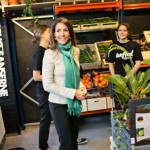 Food waste remains at criminally high levels, with studies suggesting that America wastes around 40% of the food it grows. There have been various projects to try and rectify things, such as CropMobster, which was run by Bloomfield Farms to offload food before it went to waste.
Food waste remains at criminally high levels, with studies suggesting that America wastes around 40% of the food it grows. There have been various projects to try and rectify things, such as CropMobster, which was run by Bloomfield Farms to offload food before it went to waste.
At a more commercial level, the Austrian restaurant BIOMAT attempted to do their bit by offering diners a free meal if they donated their food waste for composting.
New York based Hello Compost is a similar scheme, with their food waste donations traded in for fresh food that is then donated to low income families in the area.
Getting retailers on board
Suffice to say, getting retailers on board is also crucially important if the issue is to be tackled successfully. The Danish supermarket WeFood shows the way. They’re the only supermarket in the country that sells only food that is past its sell by date.
As a result of this, the food is listed for roughly 50% less than similar items in normal shops.
The venture, which is located in Copenhagen and run by a team of volunteers, has already secured a number of deals with retailers to accept food that would ordinarily go to waste.
In addition to providing shoppers with cheaper food and reducing the amount that’s wasted, the project also hopes to help reduce hunger more widely by donating proceeds to the DanChurchAid charity.
In Denmark alone, it’s believed that more than 700,000 tons of food is wasted each year, with the problem very much on the government’s radar.
The Danish Minister for Food and the Environment, Eva Kjer Hansen says: “It’s ridiculous that food is just thrown out or goes to waste.
“It is bad for the environment and it is money spent on absolutely nothing.
“A supermarket like WeFood makes so much sense and is an important step in the battle to combat food waste.”
The hope has to be that things will progress from these relatively small and niche projects to something more systemic.
Indeed, France passed a law recently making it illegal for supermarkets to throw away waste food and instead to donate it to charities and food banks.
Likewise, there was a commitment from British grocers to reduce food-waste by 20% by 2025 recently.
I would love to think that from these small acorns something larger can grow and we can get on top of what is a serious issue. The evidence thus far suggests that the scale of the problem is indeed vast, but we can but hope.
What a great idea, and a much needed one too.
Wow. I am definitely going share this with a few of my friends. Very cool information.